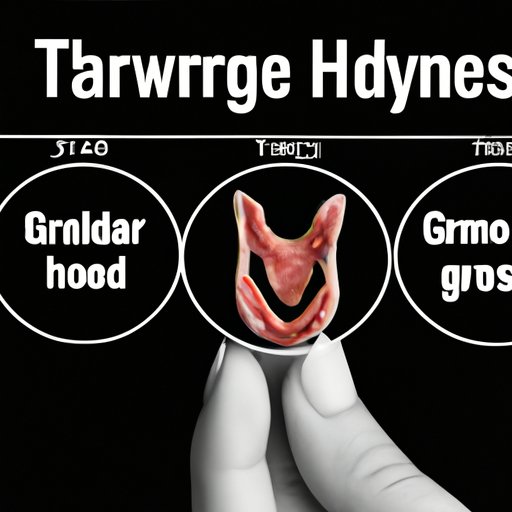
I. Introduction
Graves’ Disease is an autoimmune disorder that affects millions of people worldwide. It is characterized by the overactivity of the thyroid gland, leading to many health issues. In this article, we will explore the relationship between Graves’ Disease and genetics. We will debunk myths and discuss facts about the heritability of the disease. Moreover, we will talk about the impact of genes on diagnosis, treatment options, and patient outcomes.
II. Understanding Graves’ Disease: Causes and Symptoms
Graves’ Disease is a complex autoimmune disorder that involves the body’s immune system attacking the thyroid gland. This leads to a build-up of thyroid hormones, which can cause a variety of symptoms. Some of the symptoms of Graves’ Disease include weight loss, increased heart rate, anxiety, and tremors. The disease can also cause eye problems such as bulging and irritation.
III. Is Graves’ Disease Genetic: Debunking the Myths and Facts
There is a lot of confusion about whether Graves’ Disease is inherited. Some people believe that the disease is purely genetic, while others think that it is entirely caused by environmental factors. However, the truth is somewhere in between. Although there are genetic components to the disease, it is not necessarily inherited in a straightforward manner. Twin studies have shown that there is both a genetic and an environmental component to the disease’s development.
IV. The Link Between Thyroid Disorders and Graves’ Disease
The thyroid gland is a crucial organ that plays a significant role in controlling the body’s metabolism. When the thyroid gland is overactive, it can cause a variety of issues that could lead to Graves’ Disease. In some cases, a person may first develop a thyroid disorder, like hypothyroidism, before being diagnosed with Graves’ Disease. Treating underlying thyroid problems can help manage Graves’ Disease and alleviate some of the associated symptoms.
V. Can Graves’ Disease Be Inherited? A Deep Dive into the Genetics of the Disease
The development of Graves’ Disease has genetic components, and several genes have been associated with it. However, the disease is complex, and it is unlikely that a single gene contributes to the disease’s development. Moreover, it is thought that environmental factors play a role in the disease’s progression. Genetic testing can help identify specific mutations and variations that may be responsible for a person’s Graves’ Disease.
VI. The Role of Genetics in Graves’ Disease: Implications for Diagnosis and Treatment
Genetic testing is increasingly used to diagnose Graves’ Disease and other autoimmune disorders. Identifying specific gene mutations related to the disease can help guide treatment decisions and predict patient outcomes. Personalized medicine is a developing area of research that takes specific genetic and environmental factors into account to create more individualized treatment plans for patients.
VII. Living with Graves’ Disease: A Guide for Patients and Families
Living with Graves’ Disease can be challenging, both physically and emotionally. It is essential to work with a healthcare professional to manage the disease and find a treatment plan that works best for you. Positive lifestyle changes, such as stress reduction and regular exercise, can also help manage the disease. Finding a supportive community and connecting with other patients and families can also be beneficial.
VIII. Case Study: A Family’s Experience with Graves’ Disease
A family struggling with Graves’ Disease can provide insight into how the genetic components of the disease can impact diagnosis and treatment decisions. Understanding the genetic bases of the disease can also help families find the support and resources they need.
IX. Conclusion
Graves’ Disease is a complex autoimmune disease that has genetic components. Although it is not strictly inherited, several genes have been associated with the disease’s development. Understanding these complex genetic interactions can help with diagnosis, treatment decisions, and support for affected individuals and families. We must continue to raise awareness and support research into the heritability of Graves’ Disease.


